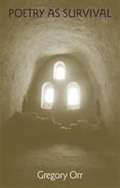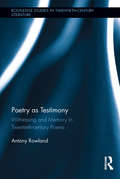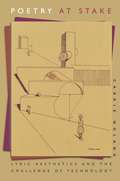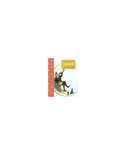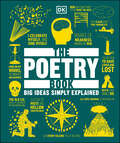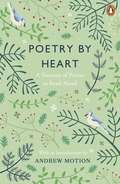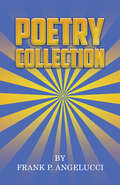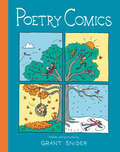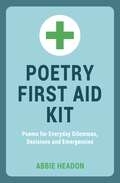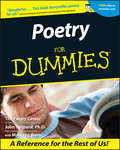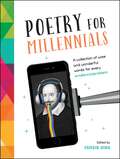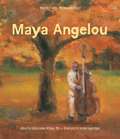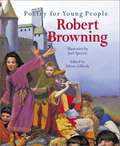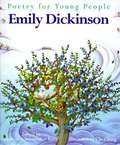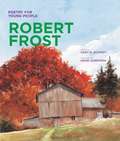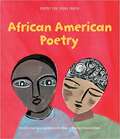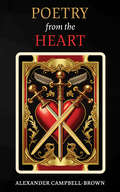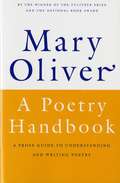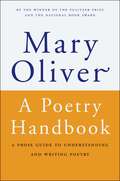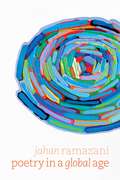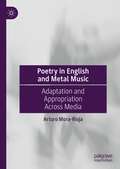- Table View
- List View
Poetry as Survival (The life of poetry)
by Gregory OrrMore specifically, he considers how the acts of writing, reading, and listening to lyric bring ordering powers to the chaos that surrounds us. Moving into more contemporary work, Orr looks at the poetry of Sylvia Plath, Stanley Kunitz, and Theodore Roethke, poets who relied on their own work to get through painful psychological experiences.
Poetry as Testimony: Witnessing and Memory in Twentieth-century Poems (Routledge Studies in Twentieth-Century Literature)
by Antony RowlandThis book analyzes Holocaust poetry, war poetry, working-class poetry, and 9/11 poetry as forms of testimony. Rowland argues that testamentary poetry requires a different approach to traditional ways of dealing with poems due to the pressure of the metatext (the original, traumatic events), the poems’ demands for the hyper-attentiveness of the reader, and a paradox of identification that often draws the reader towards identifying with the poet’s experience, but then reminds them of its sublimity. He engages with the work of a diverse range of twentieth-century authors and across the literature of several countries, even uncovering new archival material. The study ends with an analysis of the poetry of 9/11, engaging with the idea that it typifies a new era of testimony where global, secondary witnesses react to a proliferation of media images. This book ranges across the literature of several countries, cultures, and historical events in order to stress the large variety of contexts in which poetry has functioned productively as a form of testimony, and to note the importance of the availability of translations to the formation of literary canons.
Poetry at Stake: Lyric Aesthetics and the Challenge of Technology
by Carrie NolandTaking seriously Guillaume Apollinaire's wager that twentieth-century poets would one day "mechanize" poetry as modern industry has mechanized the world, Carrie Noland explores poetic attempts to redefine the relationship between subjective expression and mechanical reproduction, high art and the world of things. Noland builds upon close readings to construct a tradition of diverse lyricists--from Arthur Rimbaud, Blaise Cendrars, and René Char to contemporary performance artists Laurie Anderson and Patti Smith--allied in their concern with the nature of subjectivity in an age of mechanical reproduction.
Poetry Basics: Limericks
by Valerie BoddenAn introduction to the poetic form known as the limerick, from its origins in the 1600s to today. Example poems and analysis explore such elements as wit and nonsense.
The Poetry Book (DK Big Ideas)
by DKAn accessible guide to the most important poems ever written— from the Epic of Gilgamesh to The Waste Land—and the poets behind themDiscover the key themes and ideas behind the most important poems ever written, and the poetic geniuses who wrote them.The perfect introduction to poetry, The Poetry Book takes you on a fascinating journey through time to explore more than 90 of the world&’s greatest poetic works.Discover poems in all their many guises and from all over the world, from the epics of the ancient world through Japanese haikus and Renaissance sonnets to modernist masterpieces such as The Waste Land, and the key works of the last 50 years—from And Still I Rise by Maya Angelou to Derek Walcott&’s Omeros.Using the Big Ideas series' trademark combination of clear explanation, witty infographics, and inspirational quotes, The Poetry Book unlocks the key ideas, themes, imagery, and structural techniques behind even the most complex of poems, in clear and simple terms, setting each work in its historical, social, cultural, and literary context. Delve into the works of Dante, Baudelaire, Rimbaud, Dickinson, Eliot, and Neruda with in-depth literary analysis and fascinating biographies. Find out what odes, ballads, and allegories are. Trace recurring motifs, explore imagery, and find out how rhyme and rhythm work. From Beowulf to Seamus Heaney's Bogland, The Poetry Book is essential reading for readers of poetry and aspiring poets alike.
Poetry by Heart: Poems for Learning and Reciting
by Andrew MotionPoetry by Heart - based on the hugely successful nationwide schools competition, 200 magical poems to learn by heart'The poems we learn stay with us for the rest of our lives. They become personal and invaluable, and what's more they are free gifts - there for the taking' Simon ArmitageTwo years ago former Poet Laureate Andrew Motion had the idea of setting up Poetry by Heart - a nationwide annual competition for secondary schools which asked contestants to learn two or three poems and be judged on their recitations, first at school level, then regional, then in a national final held at London's National Portrait Gallery. It's proved a huge success, with hundreds of schools participating in the first year, and numbers up by 20% in the second. Coinciding with the start of the third year of competition, and published on National Poetry Day whose theme coincidentally in 2014 is Recitation, this Poetry by Heart anthology brings together the pool of poems - 200 altogether - from which contestants make their choices. Specially picked by Motion and his three co-editors, these poems make up a treasure house - of almost-unknown poems and familiar poems from the mainstream; love poems and war poems; funny poems and heartbroken poems; poems that recreate the world we know and poems written on the dark side of the moon. And all chosen with a view to their being recited out loud.From William Wordsworth to Wilfred Owen, Emily Brontë to Elizabeth Bishop this wonderfully enjoyable anthology will be enjoyed by all ages and includes the best poets from the past to the present day. In a groundbreaking feature, the book includes QR codes which allow readers to use their mobile phones to listen to recordings of the poems - many of them specially recorded by the poets themselves. Sir Andrew Motion was Poet Laureate from 1999 till 2009, and is Professor of Creative Writing at Royal Holloway College, London. Jean Sprackland'sTilt won the Costa Poetry award in 2008. She is a Reader in Poetry at Manchester Metropolitan University. Julie Blake is co-Founder and Director of The Full English, an organization based in Bristol which provides support to teachers of English Literature. Mike Dixon is an educational consultant specializing in English in the classroom.
Poetry Collection
by Frank P. AngelucciDelve into a poetic tapestry that weaves the myriad facets of life's journey. This collection resonates with human emotions, offering solace to souls seeking comfort and connection. Inspired by everyday moments and the indelible impact of loved ones – both present and departed – these verses are a testament to the beauty and complexity of existence. Embark on a literary voyage, and may you find as much joy in these pages as I found in penning them.
Poetry Comics
by Grant Snider“A poetry-filled graphic novel that is powerful in its simplicity.” ―Publishers Weekly, Starred Review "Personal but personable, too, with glints of quiet humor.” ―Kirkus Reviews, Starred Review “Poetry Comics is . . . a sensorial experience that taps into what it means to be human and leaves you inspired to explore, discover, create, and connect.” —Aron Nels Steinke, Eisner Award-winning cartoonist From the creator of Incidental Comics, Grant Snider, comes a fun and imaginative book that combines poetry and comics in a whole new way. Perfect for poetry lovers and reluctant readers alike.From the cloud-gazing hours of early spring to the lost bicycles of late autumn, Grant Snider’s brilliantly illustrated Poetry Comics will take you climbing, floating, swimming, and tumbling through all the year’s ups, downs, and in-betweens. He proves that absolutely everything, momentous or minuscule, is worthy of attention, whether snail shells, building blocks, the lamented late bus, or the rare joy of unscuffed shoes. These poems explore everything you never thought to write a poem about, and they’re so fun to read you’ll want to write one yourself. Not to worry, there’s a poem for that, too!FOR COMIC BOOK FANS: These poems for kids are brightly illustrated in graphic novel-style panels, adding a delightful new element to approaching poetry. Perfect for visually oriented readers and young people who already love comics, cartoons, and graphic novels.EXCITING NEW APPROACH TO POETRY: Funny, instructive, and thoroughly engaging, this poem book is a perfect addition to classroom libraries and poetry curricula. POEMS FOR EVERY SEASON: With sections for winter, spring, summer, and fall, this poetry book offers teachers and kids lots to enjoy and share all year round. SPARK A LOVE OF POETRY AND ART: Perfect for classroom writing and drawing prompts, this book will inspire readers of all ages to make and share poetry comics of their own!Perfect for:Young readers of comics and graphic novelsAspiring poets, writers, and cartoonistsParents and educators seeking a fun and engaging way to introduce kids to poetryReading and sharing during Poetry MonthReaders looking for contemporary additions to classic children's poetry like Shel Silverstein's Where the Sidewalk Ends, Falling Up, and A Light in the AtticFans of Mary Oliver looking to share an equally contemplative, nature-loving poet with kidsFans of Grant Snider books, including Nothing Ever Happens on a Gray Day, What Color Is Night?, What Sound Is Morning?, One Boy Watching, and There Is a Rainbow
Poetry First Aid Kit: Poems For Everyday Dilemmas, Decisions and Emergencies
by Abbie HeadonWhether your dilemma is something as simple as a what to have for dinner or you are trying to make a life-changing decision, the Poetry First Aid Kit has the answer. Seek a solution within these stanzas and let the enlightening limericks and illuminating iambic pentameter help you resolve the dilemmas in your life.
Poetry First Aid Kit: Poems For Everyday Dilemmas, Decisions and Emergencies
by Abbie HeadonWhether your dilemma is something as simple as a what to have for dinner or you are trying to make a life-changing decision, the Poetry First Aid Kit has the answer. Seek a solution within these stanzas and let the enlightening limericks and illuminating iambic pentameter help you resolve the dilemmas in your life.
Poetry For Dummies (For Dummies Ser.)
by The Poetry Center John TimpaneSometimes it seems like there are as many definitions of poetry as there are poems. Coleridge defined poetry as “the best words in the best order.” St. Augustine called it “the Devil’s wine.” For Shelley, poetry was “the record of the best and happiest moments of the happiest and best minds.” But no matter how you define it, poetry has exercised a hold upon the hearts and minds of people for more than five millennia. That’s because for the attentive reader, poetry has the power to send chills shooting down the spine and lightning bolts flashing in the brain — to throw open the doors of perception and hone our sensibilities to a scalpel’s edge. Poetry For Dummies is a great guide to reading and writing poems, not only for beginners, but for anyone interested in verse. From Homer to Basho, Chaucer to Rumi, Shelley to Ginsberg, it introduces you to poetry’s greatest practitioners. It arms you with the tools you need to understand and appreciate poetry in all its forms, and to explore your own talent as a poet. Discover how to: Understand poetic language and forms Interpret poems Get a handle on poetry through the ages Find poetry readings near you Write your own poems Shop your work around to publishers Don’t know the difference between an iamb and a trochee? Worry not, this friendly guide demystifies the jargon, and it covers a lot more ground besides, including: Understanding subject, tone, narrative; and poetic language Mastering the three steps to interpretation Facing the challenges of older poetry Exploring 5,000 years of verse, from Mesopotamia to the global village Writing open-form poetry Working with traditional forms of verse Writing exercises for aspiring poets Getting published From Sappho to Clark Coolidge, and just about everyone in between, Poetry For Dummies puts you in touch with the greats of modern and ancient poetry. Need guidance on composing a ghazal, a tanka, a sestina, or a psalm? This is the book for you.
Poetry for Millennials: A Collection of Wise and Wonderful Words for Every #MillennialProblem
by Tamsin KingWhen your partner spends too much time on their Xbox:Why so pale and wan, fond lover? Prithee, why so pale? from ‘Why So Pale and Wan?’, John Suckling From dating and house-shares to digital detoxing and growing up, Poetry for Millennials is the answer to all your hardships and woes. It offers relatable verse from some of our greatest literary figures to help you laugh away the most common millennial problems *after wiping away your tears*.
Poetry for Young People: Maya Angelou
by Maya Angelou Edwin Graves WilsonMaya Angelou is the first living poet to be honored in this Poetry for Young People series. Twenty-five of her finest poems capture a range of emotions and experiences, from the playful “Harlem Hopscotch” to the prideful “Me and My Work” to the soul-stirring “Still I Rise.”
Poetry for Young People
by Robert BrowningRobert Browning's poetry has mysteries and a beauty of language that youngsters will love exploring, from the classic and beloved Pied Piper of Hamelin to the charming verse play Pippa Passes. Perfect for parents to read aloud or along with their children, and accompanied by striking artwork, here is a selection of some of Browning's most reader-friendly works. Several paintings compellingly capture Pied Piper's drama: the Piper, smiling as he offers his services; the rats fleeing the town in droves; and the entranced children who will soon be lost forever. Home Thoughts from Abroad ("Oh, to be in England, Now that April's there. . . ") features illustrations of the countryside in full bloom. There are 25 excerpts in all, fully annotated to enrich young readers' understanding of these poems. Dr. Eileen Gillooly earned her Ph. D. from Columbia University, where she is Director of the Core Curriculum and teaches nineteenth-century literature and culture. She has also edited another entry in the Poetry for Young People series on Rudyard Kipling. Joel Spector's work appears regularly in books, in newspapers such as the New York Times, in magazines such as Business Week, Good Housekeeping, and Newsweek, and throughout Europe and in Japan. He lives in Connecticut.
Poetry for Young People
by Emily Dickinson Frances S. BolinIncludes more than 35 of Dickinson's best loved poems, including "I'm nobody, who are you?" and "I started early, took my dog."
Poetry for Young People: Langston Hughes
by Arnold Rampersad David Roessel Langston HughesA study for young people of Langston Hughes with several of his poems
Poetry for Young People: Robert Frost
by Gary D. SchmidtA collection of poems about the four seasons by one of best-known American poets.
Poetry for Young People: African American Poetry (Poetry For Young People Ser.)
by Arnold Rampersad Marcellus BlountThe newest addition to the acclaimed Poetry for Young People series shines a light on the power and beauty of African-American verse. Co-editors Arnold Rampersad and Marcellus Blount--both towering figures in literary criticism--have put together an impressive anthology that will open up a world of wonderful word images for children. Helpful and generous annotations, a lively introduction, and beautiful illustrations by Karen Barbour make this the ideal book to introduce young readers to the marvels of poetry.
Poetry from the Heart
by Alexander Campbell-BrownExperiences. Emotions. Told through poems that speak more than their words. Based on personal experiences, experiences of others and those more universally experienced. A home within the words. Lives within the pages. Have you ever had an experience that you couldn’t just quite describe: to be so full of emotion that you couldn’t verbalise exactly how you’re feeling? Flip through these pages and discover the words that you were missing. Written from those same raw, human experiences and emotions. For any and all to enjoy. A range of poems from personal and everyday troubles to topics dealing with society and governance. Delve into the realms of romance and friendships, or perhaps under a tree with nature; join us on the true adventures of the life within. Whatever your preferences, there’ll be a poem in here, waiting for you to discover it. All you need to do is sit back and read.
A Poetry Handbook
by Mary OliverWith passion, wit, and good common sense, the celebrated poet Mary Oliver tells of the basic ways a poem is built-meter and rhyme, form and diction, sound and sense. Drawing on poems from Robert Frost, Elizabeth Bishop, and others, Oliver imparts an extraordinary amount of information in a remarkably short space. “Stunning” (Los Angeles Times).
A Poetry Handbook: A Prose Guide to Understanding and Writing Poetry
by Mary Oliver“Mary Oliver would probably never admit to anything so grandiose as an effort to connect the conscious mind and the heart (that’s what she says poetry can do), but that is exactly what she accomplishes in this stunning little handbook.”—Los Angeles Times From the beloved and acclaimed poet, an ultimate guide to writing and understanding poetry. With passion and wit, Mary Oliver skillfully imparts expertise from her long, celebrated career as a disguised poet. She walks readers through exactly how a poem is built, from meter and rhyme, to form and diction, to sound and sense, drawing on poems by Robert Frost, Elizabeth Bishop, and others. This handbook is an invaluable glimpse into Oliver’s prolific mind—a must-have for all poetry-lovers.
Poetry in a Global Age
by Jahan RamazaniIdeas, culture, and capital flow across national borders with unprecedented speed, but we tend not to think of poems as taking part in globalization. Jahan Ramazani shows that poetry has much to contribute to understanding literature in an extra-national frame. Indeed, the globality of poetry, he argues, stands to energize the transnational turn in the humanities. Poetry in a Global Age builds on Ramazani’s award-winning A Transnational Poetics, a book that had a catalytic effect on literary studies. Ramazani broadens his lens to discuss modern and contemporary poems not only in relation to world literature, war, and questions of orientalism but also in light of current debates over ecocriticism, translation studies, tourism, and cultural geography. He offers brilliant readings of postcolonial poets like Agha Shahid Ali, Lorna Goodison, and Daljit Nagra, as well as canonical modernists such as W. B. Yeats, Wallace Stevens, T. S. Eliot, and Marianne Moore. Ramazani shows that even when poetry seems locally rooted, its long memory of forms and words, its connections across centuries, continents, and languages, make it a powerful imaginative resource for a global age. This book makes a strong case for poetry in the future development of world literature and global studies.
Poetry in a Global Age
by Jahan RamazaniIdeas, culture, and capital flow across national borders with unprecedented speed, but we tend not to think of poems as taking part in globalization. Jahan Ramazani shows that poetry has much to contribute to understanding literature in an extra-national frame. Indeed, the globality of poetry, he argues, stands to energize the transnational turn in the humanities. Poetry in a Global Age builds on Ramazani’s award-winning A Transnational Poetics, a book that had a catalytic effect on literary studies. Ramazani broadens his lens to discuss modern and contemporary poems not only in relation to world literature, war, and questions of orientalism but also in light of current debates over ecocriticism, translation studies, tourism, and cultural geography. He offers brilliant readings of postcolonial poets like Agha Shahid Ali, Lorna Goodison, and Daljit Nagra, as well as canonical modernists such as W. B. Yeats, Wallace Stevens, T. S. Eliot, and Marianne Moore. Ramazani shows that even when poetry seems locally rooted, its long memory of forms and words, its connections across centuries, continents, and languages, make it a powerful imaginative resource for a global age. This book makes a strong case for poetry in the future development of world literature and global studies.
Poetry in a Global Age
by Jahan RamazaniIdeas, culture, and capital flow across national borders with unprecedented speed, but we tend not to think of poems as taking part in globalization. Jahan Ramazani shows that poetry has much to contribute to understanding literature in an extra-national frame. Indeed, the globality of poetry, he argues, stands to energize the transnational turn in the humanities. Poetry in a Global Age builds on Ramazani’s award-winning A Transnational Poetics, a book that had a catalytic effect on literary studies. Ramazani broadens his lens to discuss modern and contemporary poems not only in relation to world literature, war, and questions of orientalism but also in light of current debates over ecocriticism, translation studies, tourism, and cultural geography. He offers brilliant readings of postcolonial poets like Agha Shahid Ali, Lorna Goodison, and Daljit Nagra, as well as canonical modernists such as W. B. Yeats, Wallace Stevens, T. S. Eliot, and Marianne Moore. Ramazani shows that even when poetry seems locally rooted, its long memory of forms and words, its connections across centuries, continents, and languages, make it a powerful imaginative resource for a global age. This book makes a strong case for poetry in the future development of world literature and global studies.
Poetry in English and Metal Music: Adaptation and Appropriation Across Media
by Arturo Mora-RiojaMany metal songs incorporate poetry into their lyrics using a broad array of techniques, both textual and musical. This book develops a novel adaptation, appropriation, and quotation taxonomy that both expands our knowledge of how poetry is used in metal music and is useful for scholars across adaptation studies broadly. The text follows both a quantitative and a qualitative approach. It identifies 384 metal songs by 224 bands with intertextual ties to 146 poems written by fifty-one different poets, with a special focus on Edgar Allan Poe, John Milton's Paradise Lost and the work of WWI's War Poets. This analysis of transformational mechanisms allows poetry to find an afterlife in the form of metal songs and sheds light on both the adaptation and appropriation process and on the semantic shifts occasioned by the recontextualisation of the poems into the metal music culture. Some musicians reuse – and sometimes amplify – old verses related to politics and religion in our present times; others engage in criticism or simple contradiction. In some cases, the bands turn the abstract feelings evoked by the poems into concrete personal experiences. The most adventurous recraft the original verses by changing the point of view of either the poetic voice or the addressed actors, altering the vocaliser of the narrative or the gender of the protagonists. These mechanisms help metal musicians make the poems their own and adjust them to their artistic needs so that the resulting product is consistent with the expectations of the metal music culture.
